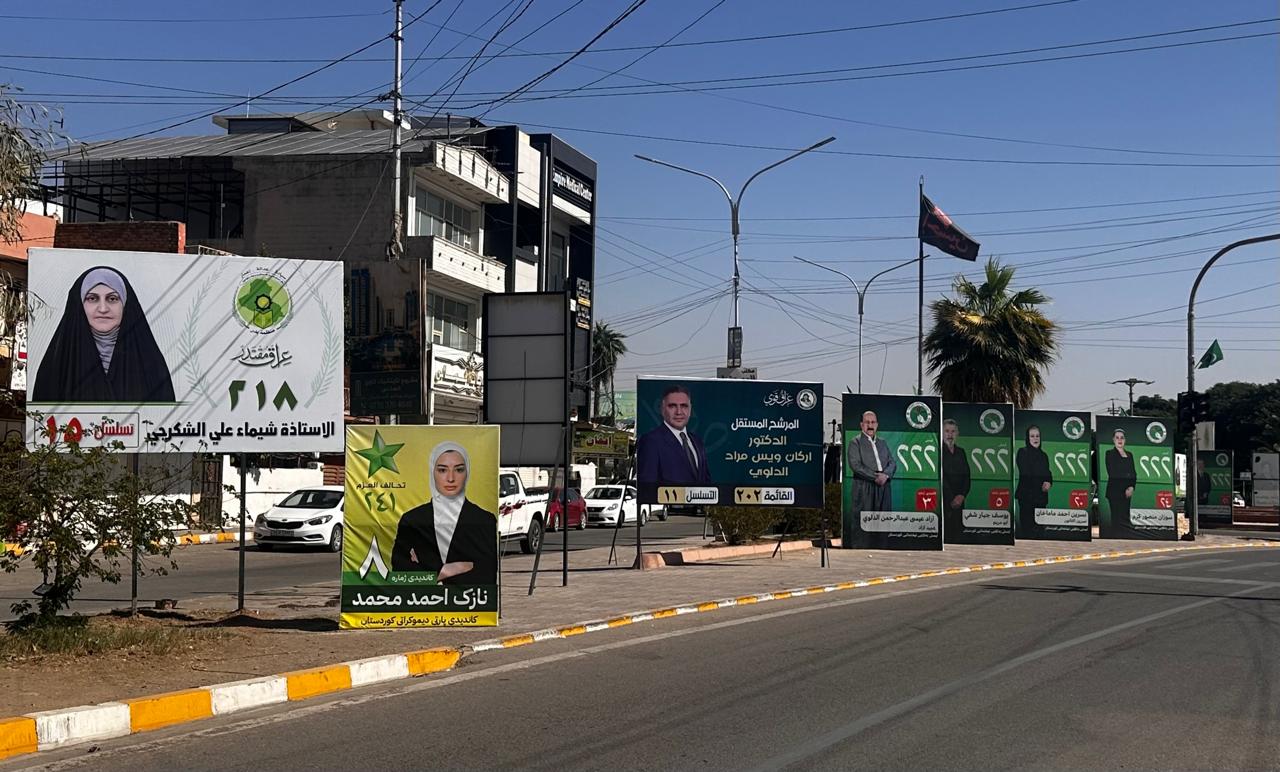Female candidates are at the forefront of party lists and alliances, aiming to secure a seat in the Iraqi Parliament for Diyala Province, which has 14 allocated seats, with four of them reserved for women's quotas.
Two female candidates are leading the lists of two Kurdish parties in Khanaqin: The Patriotic Union of Kurdistan (PUK) and the Kurdistan Socialist Party (KSP). The Kurdistan Democratic Party (KDP) has one female candidate in Khanaqin, running as part of the Azim (Determination) Alliance, led by Muthanna al-Samarrai. Meanwhile, the New Generation Movement list includes three women out of four candidates.
This trend mirrors similar efforts by two major alliances in Diyala: The Badr Alliance and the Alternative Alliance, each with a female candidate in Khanaqin, vying for the support of the district's voters.
Some parties are aiming to secure one of the four quota seats reserved for women in Diyala province, potentially at the expense of votes from Khanaqin and its surrounding areas. Data from the Independent High Electoral Commission of Iraq IHEC shows that in the last parliamentary elections in 2021, over 205,000 votes were cast.
Lamia Mohammed, a PUK candidate in Diyala province, expressed to KirkukNow, "Appointing a woman as the head of the PUK list reflects the party's commitment to women's empowerment in the political and electoral spheres."
"It serves as an encouragement for female voters to engage in the process and select their representatives," she added.
Khanaqin, a disputed area in Diyala province, has a Kurdish majority population. Since the 2005 elections, Kurds have consistently secured one or more seats in the province.
"Having a woman lead the PUK list is not about securing a parliamentary seat through the quota system, as the party historically garners enough support from Khanaqin voters to secure a seat in every election," Lamia clarified.
However, this strategy may differ for the Kurdistan Democratic Party (KDP), which does not have its own list. Lamia noted that the KDP "aims to win the women's quota seat in Diyala province with the votes from Khanaqin residents within the Azm Alliance. The party has nominated one woman to consolidate all the votes."
If the Azm Alliance succeeds in securing a parliamentary seat and the quota seat, it will be awarded to the candidate with the highest number of votes on the list. The KDP, which received 7,000 votes in Khanaqin during the 2023 provincial council elections, is hopeful to win the women's quota seat.
Akbar Haider, head of the (KDP) branch in Khanaqin, stated, "We are not only aiming to secure the women's quota seat in Diyala province, but we also aspire to win parliamentary seats with our votes and have our sole candidate emerge victorious."
"The KDP places significant emphasis on women's participation in the political process. The candidate's qualifications were a key factor in her nomination. Nazik Ahmed, a university professor from a prominent Khanaqin family with a master's degree in Arabic language, possesses the qualities to effectively represent her people in parliament," Haider emphasized.
Iraq's Independent High Electoral Commission has released the names of 7,768 candidates for the parliamentary elections scheduled for November 11, with 2,248 being women.
Women make up 29 percent of the total candidates spread across all provinces. Under Iraq's electoral law, 25 percent of the 329 seats are reserved for women, totaling 83 seats.
The Badr Alliance, led by Hadi al-Ameri, is competing with a female candidate to secure votes in Khanaqin.
Mohammed al-Shakarchi, head of Badr's office in Khanaqin, noted, "Khanaqin has not received the educational attention it deserves, so we have nominated a woman working in the education sector."
"We believe Shaima al-Shakarchi is the strongest candidate within the Badr Alliance in the Diyala district, particularly in Khanaqin," he added.
The Alternative Alliance, consisting of members of the Tishreen Party, several leftist parties, and independent figures, also nominated a woman in Khanaqin. However, she was disqualified by the electoral commission during the first week of the campaign.
Rabia Abbas, who was disqualified from the race, remarked, "Parties nominate women when they feel their seats are at risk to safeguard their party's interests rather than to empower women. Women who run solely to win seats without genuine commitment cannot effectively represent and shape public policy."
Rabia called for a shift in men's perceptions of women's political involvement and urged complete confidence in women's participation to strengthen the women's movement in Iraq.
According to statistics from the High Electoral Commission, there are 103 female candidates in Diyala Province, with the majority vying for the four quota seats. Additionally, 262 candidates are competing for the other ten seats allocated to the province.
These candidates will be determined through votes or the quota system, with Diyala's 1,052,000 voters heading to the polls on November 11.





